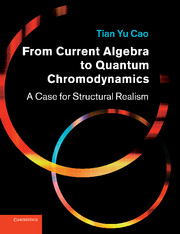Book contents
- Frontmatter
- Contents
- Preface
- 1 Introduction
- 2 The rise of current algebra
- 3 Sum rules
- 4 Saturation and closure
- 5 Scaling
- 6 Theorizations of scaling
- 7 The advent of QCD
- 8 Early justifications and explorations
- 9 Structural realism and the construction of QCD
- 10 Structural realism and the construction of the CA–QCD narrative
- References
- Author index
- Subject index
1 - Introduction
Published online by Cambridge University Press: 06 December 2010
- Frontmatter
- Contents
- Preface
- 1 Introduction
- 2 The rise of current algebra
- 3 Sum rules
- 4 Saturation and closure
- 5 Scaling
- 6 Theorizations of scaling
- 7 The advent of QCD
- 8 Early justifications and explorations
- 9 Structural realism and the construction of QCD
- 10 Structural realism and the construction of the CA–QCD narrative
- References
- Author index
- Subject index
Summary
In the 1950s, all hadrons, namely particles that are involved in strong interactions, including the proton and neutron (or nucleons) and other baryons, together with pions and kaons and other mesons, were regarded as elementary particles. Attempts were made to take some particles, such as the proton, neutron and lambda particle, as more fundamental than others, so that all other hadrons could be derived from the fundamental ones (Fermi and Yang, 1949; Sakata, 1956). But the prevailing understanding was that all elementary particles were equally elementary, none was more fundamental than others. This general consensus was summarized in the notion of “nuclear democracy” or “hadronic egalitarianism” (Chew and Frautschi, 1961a, b; Gell-Mann, 1987).
As to the dynamics that governs hadrons' behavior in the processes of strong interactions, early attempts to model on the successful theory of quantum electrodynamics (or QED, a special version of quantum field theory, or QFT, in the case of electromagnetism), namely the meson theory, failed, and failed without redemption (cf. Cao, 1997, Section 8.2). More general oppositions to the use of QFT for understanding strong interactions were raised by Landau and his collaborators, on the basis of serious dynamical considerations (Landau, Abrikosov, and Khalatnikov, 1954a, b, c, d; Landau, 1955). The resulting situation since the mid 1950s was characterized by a general retreat from fundamental investigations to phenomenological ones in hadron physics.
- Type
- Chapter
- Information
- From Current Algebra to Quantum ChromodynamicsA Case for Structural Realism, pp. 1 - 13Publisher: Cambridge University PressPrint publication year: 2010



